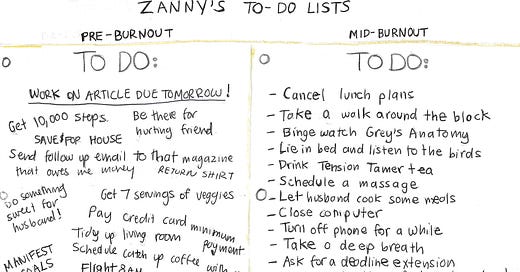Hi Zan, Hi Pa
Volume #16
May 10th, 2024
HI, PA: I have to admit—I feel really close to burnout these days. I’ve taken five trips since December (two of them international), attended six different conferences or networking events in the last few months, and have so many weekly work and social obligations that my schedule has become overwhelming. Luckily I learned the hard way as a teen how to recognize the symptoms of burnout and address them, but this has me thinking about work-life balance. Why do you think that’s something Americans specifically struggle with?
HI, ZAN: I’d worry at that first sentence except I know you know how to take care of yourself.
Your question reflects the fact that you’ve spent—what?—ten percent of your life living outside the U.S. For me it’s maybe 7%, more than five years all told. We’ve both seen first-hand how different the work-nonwork balance is in other places, and the effect that balance has on people’s mental and physical health. And we’ve gotten a good perspective on America’s strengths and weaknesses.
I don’t know why we Americans work so hard. (This article talks about people who are asked to work way beyond their regular hours.) Not all of our ancestors came here willingly, or even arrived from other countries, but those who did (the vast majority) were likely some of the most ambitious people in the places they came from. A lot of those places had little upward mobility, or were mired in poverty or strife, and the people who emigrated to this country wanted, simply, a better life for themselves and their descendants and were willing to make huge sacrifices to that end. So ambition is embedded in the gene pool.
That’s part of it. Another part has to do with what we’re guaranteed and not guaranteed. In a lot of European countries, the burden of paying for health care, education, childcare, and elderly care is more equally shared. Taxes are higher, but there isn’t the massive pressure of daycare costs, big college tuition bills, nursing home expenses, or the worry that, if you get the wrong kind of disease at the wrong time, you can lose everything you have. Those worries—fears, really—are more than enough to keep us on the treadmill.
Lastly, the myth of rags to riches is largely that, a myth, but not completely. There still are people who, by virtue of skill, luck, and/or a lot of hard work, rise from poverty to great wealth in one generation. That’s the carrot. The above-mentioned worries are the stick.
What do you think?
Keep reading with a 7-day free trial
Subscribe to Hi Zan, Hi Pa to keep reading this post and get 7 days of free access to the full post archives.





